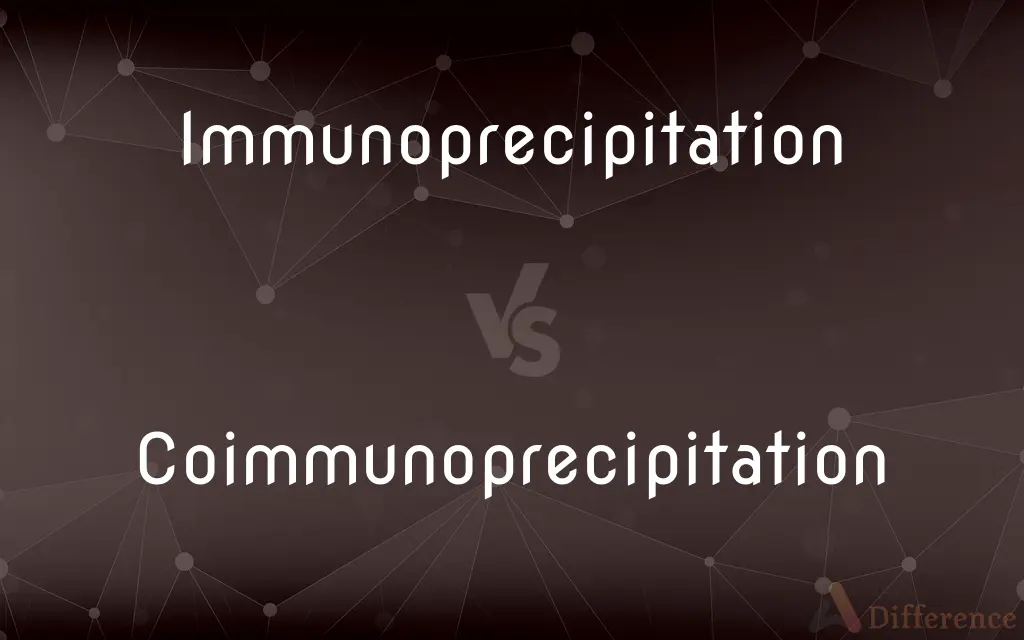Immunoprecipitation vs. Coimmunoprecipitation — What's the Difference?
Edited by Tayyaba Rehman — By Fiza Rafique — Published on October 3, 2023
Immunoprecipitation is a technique to isolate a specific protein from a mixture, while coimmunoprecipitation isolates a protein along with its interacting partners.

Difference Between Immunoprecipitation and Coimmunoprecipitation
Table of Contents
ADVERTISEMENT
Key Differences
Immunoprecipitation (IP) is a widely-used laboratory technique that enables the purification of a specific protein from a cell extract or other complex protein mixture. Coimmunoprecipitation (Co-IP), meanwhile, extends this methodology to capture not just the protein of interest but also its associating proteins.
Fiza Rafique
Oct 03, 2023
Both Immunoprecipitation and Coimmunoprecipitation rely heavily on the specificity and affinity of the antibody for the target protein. While IP focuses on a singular protein, Co-IP offers insights into molecular interactions and protein complexes.
Fiza Rafique
Oct 03, 2023
In a broader sense, Immunoprecipitation serves as a foundation for Coimmunoprecipitation. While IP provides insight into protein expression and post-translational modifications, Co-IP sheds light on the dynamic interplay between proteins within a cellular context.
Fiza Rafique
Oct 03, 2023
In the IP process, an antibody specific to the target protein is used to selectively bind and then pull down that protein. In Co-IP, the primary aim is to detect protein-protein interactions, where an antibody against one protein can bring down that protein and any proteins directly interacting with it.
Fiza Rafique
Oct 03, 2023
The methodology for both techniques is quite similar. However, Co-IP assays must ensure that the detected interactions are genuine and not artifacts of the procedure. This often requires validation through complementary methods.
Fiza Rafique
Oct 03, 2023
ADVERTISEMENT
Comparison Chart
Primary Purpose
Isolate a specific protein
Isolate a protein along with its interacting partners
Fiza Rafique
Oct 03, 2023
Antibody Usage
Specific to target protein
Specific to one protein to pull down associated proteins
Fiza Rafique
Oct 03, 2023
Validation Needs
Relatively straightforward
Requires more extensive validation
Fiza Rafique
Oct 03, 2023
Insight Offered
Protein presence, modifications
Protein interactions, molecular associations
Fiza Rafique
Oct 03, 2023
ADVERTISEMENT
Definitions
Immunoprecipitation
A method to purify a particular protein.
Immunoprecipitation was employed to isolate the enzyme from the cell lysate.
Fiza Rafique
Sep 27, 2023
Coimmunoprecipitation
Detects protein-protein interactions.
Coimmunoprecipitation experiments revealed a novel interaction between the two proteins.
Fiza Rafique
Sep 27, 2023
Immunoprecipitation
Uses antibodies to pull down proteins.
Immunoprecipitation enabled the capture of the target protein from the sample.
Fiza Rafique
Sep 27, 2023
Coimmunoprecipitation
Uses one protein to pull down its partners.
We employed Coimmunoprecipitation to explore the partners of the kinase.
Fiza Rafique
Sep 27, 2023
Immunoprecipitation
Separates proteins from complex mixtures.
Immunoprecipitation helped us distinguish the protein from other cellular components.
Fiza Rafique
Sep 27, 2023
Coimmunoprecipitation
Reveals molecular associations in cells.
Coimmunoprecipitation studies unveiled the dynamic association of the receptor with multiple proteins.
Fiza Rafique
Sep 27, 2023
Immunoprecipitation
Assesses protein levels and modifications.
Through Immunoprecipitation, we examined the phosphorylation status of the protein.
Fiza Rafique
Sep 27, 2023
Coimmunoprecipitation
Extends Immunoprecipitation to study complexes.
Utilizing Coimmunoprecipitation, we further probed the results from the Immunoprecipitation assay.
Fiza Rafique
Sep 27, 2023
Immunoprecipitation
Requires specific antibody binding.
The success of Immunoprecipitation hinges on the specificity of the antibody.
Fiza Rafique
Sep 27, 2023
Coimmunoprecipitation
Needs thorough validation of interactions.
The Coimmunoprecipitation findings were cross-checked using other biochemical techniques.
Fiza Rafique
Sep 27, 2023
Immunoprecipitation
Immunoprecipitation (IP) is the technique of precipitating a protein antigen out of solution using an antibody that specifically binds to that particular protein. This process can be used to isolate and concentrate a particular protein from a sample containing many thousands of different proteins.
Fiza Rafique
Oct 25, 2022
Coimmunoprecipitation
(immunology) The immunoprecipitation of multiple antigens at the same time
Fiza Rafique
Oct 25, 2022
Immunoprecipitation
(immunology) A technique in which an antigen is precipitated from solution by using an antibody, or a particular use of this technique.
We carried out sequential immunoprecipitations of cell lysates.
Fiza Rafique
Oct 25, 2022
FAQs
How does Coimmunoprecipitation differ?
Coimmunoprecipitation captures a protein and its interacting partners.
Fiza Rafique
Oct 03, 2023
Why is antibody specificity crucial in these techniques?
The specificity ensures the correct protein (and its partners) are isolated.
Fiza Rafique
Oct 03, 2023
Are there alternative methods to Co-IP for detecting protein interactions?
Yes, such as yeast two-hybrid or mass spectrometry.
Fiza Rafique
Oct 03, 2023
Can IP detect protein interactions?
No, IP focuses on isolating a singular protein. For interactions, Co-IP is used.
Fiza Rafique
Oct 03, 2023
Can Co-IP determine indirect protein interactions?
Co-IP primarily detects direct interactions, but indirect ones may also be pulled down.
Fiza Rafique
Oct 03, 2023
Can any antibody be used for IP or Co-IP?
Ideally, antibodies should be validated for IP or Co-IP use.
Fiza Rafique
Oct 03, 2023
What is Immunoprecipitation?
Immunoprecipitation is a technique that isolates a specific protein from a mixture using a specific antibody.
Fiza Rafique
Oct 03, 2023
Are the methods for IP and Co-IP similar?
Yes, but Co-IP requires additional validation to confirm genuine interactions.
Fiza Rafique
Oct 03, 2023
What challenges exist in Co-IP?
Distinguishing genuine interactions from artifacts is a challenge.
Fiza Rafique
Oct 03, 2023
Author Spotlight
Written by
Fiza RafiqueFiza Rafique is a skilled content editor at AskDifference.com, where she meticulously refines and enhances written pieces. Drawing from her vast editorial expertise, Fiza ensures clarity, accuracy, and precision in every article. Passionate about language, she continually seeks to elevate the quality of content for readers worldwide.
Edited by
Tayyaba RehmanTayyaba Rehman is a distinguished writer, currently serving as a primary contributor to askdifference.com. As a researcher in semantics and etymology, Tayyaba's passion for the complexity of languages and their distinctions has found a perfect home on the platform. Tayyaba delves into the intricacies of language, distinguishing between commonly confused words and phrases, thereby providing clarity for readers worldwide.

















































